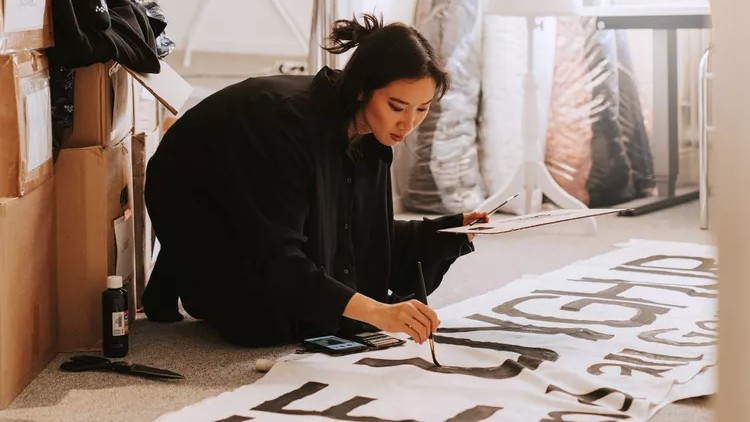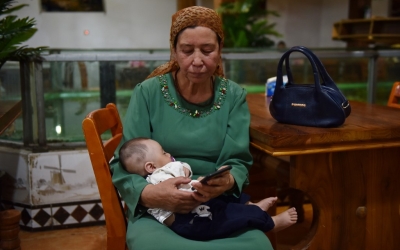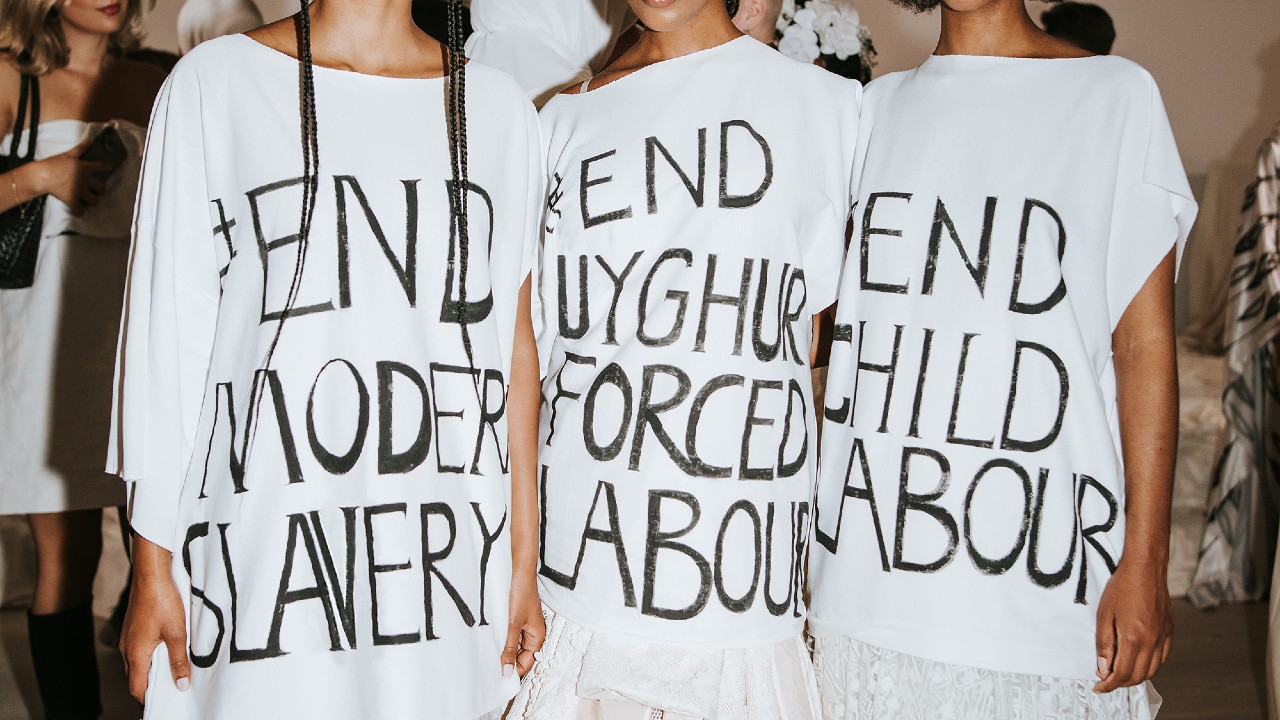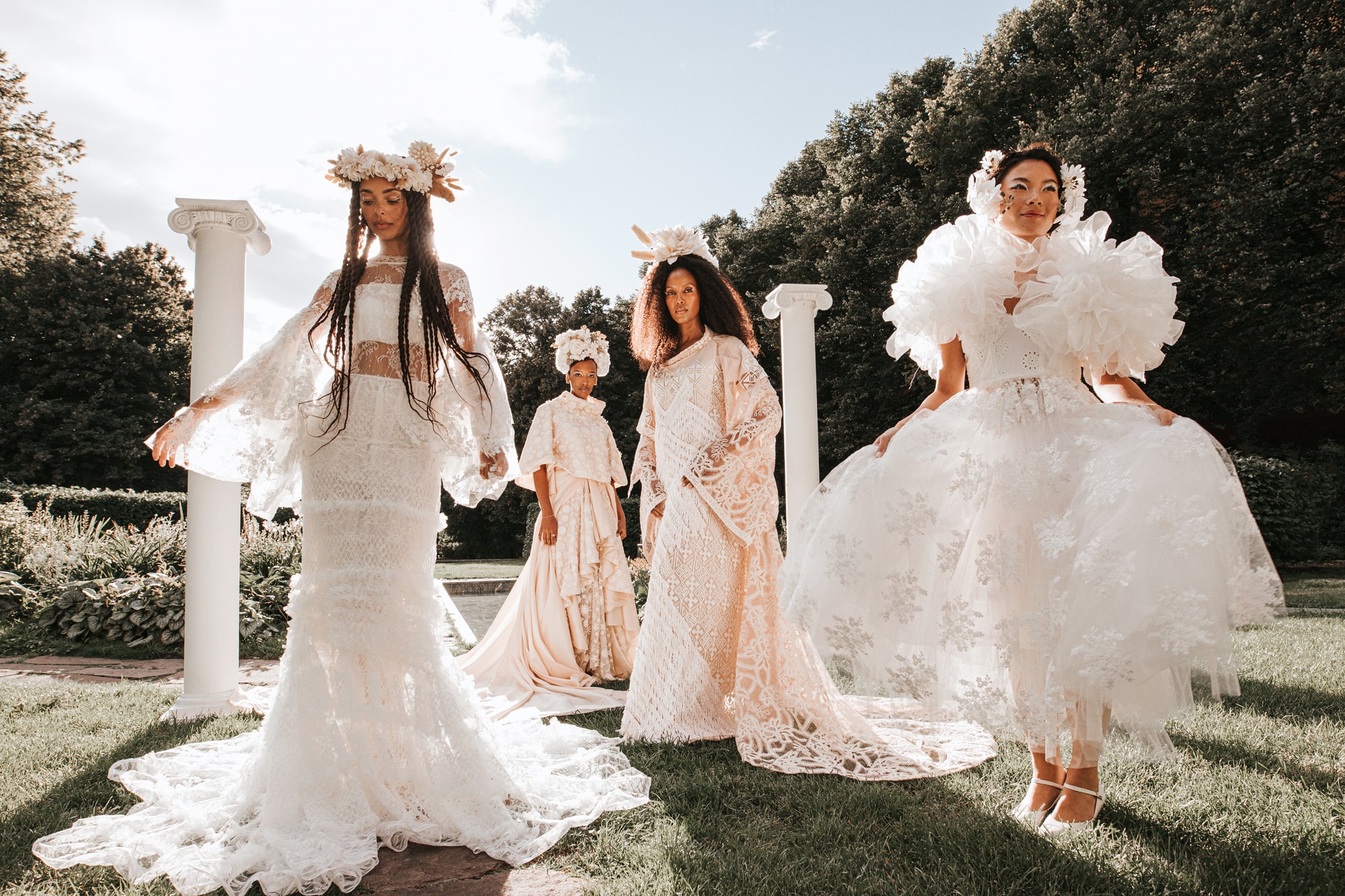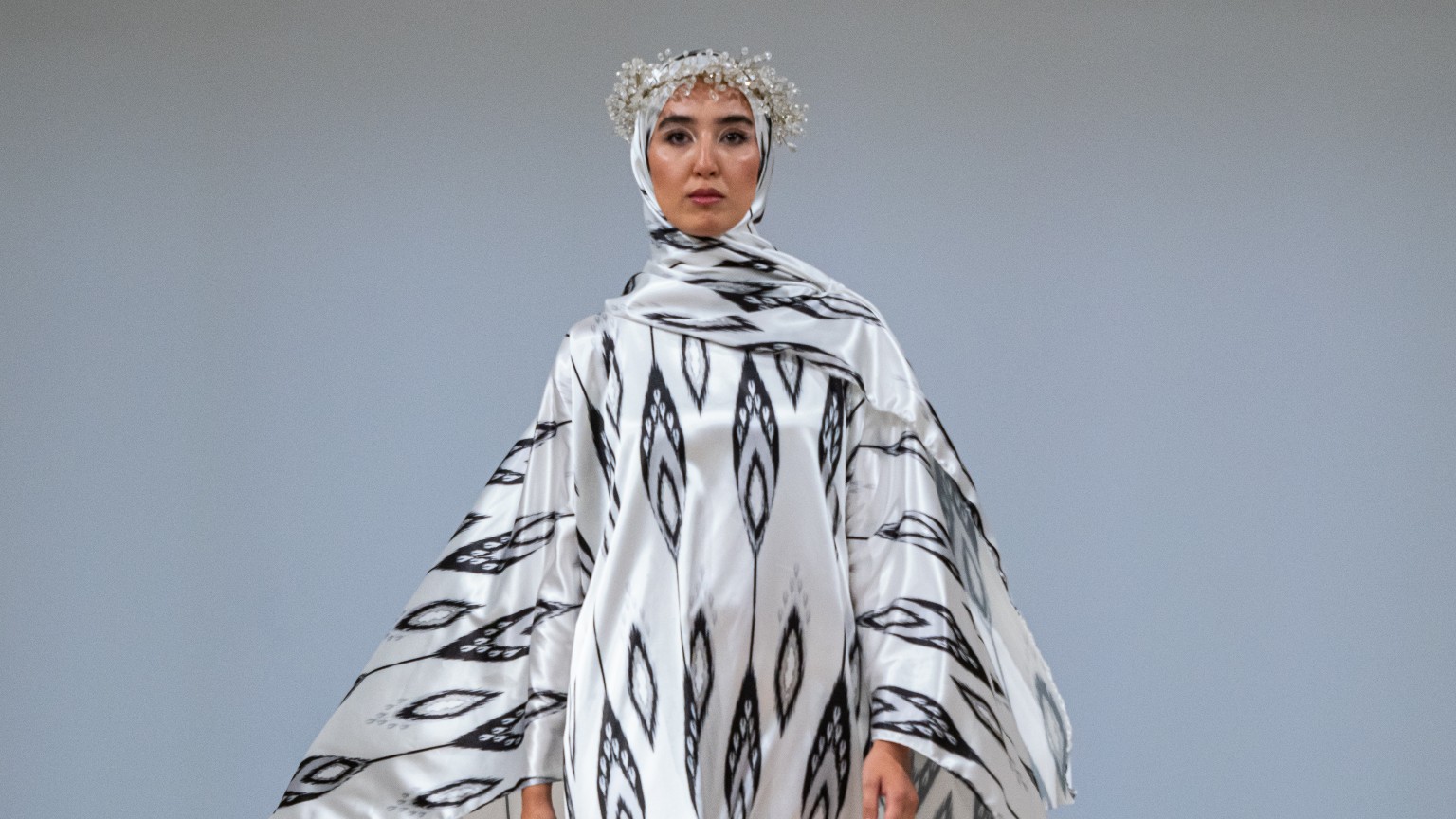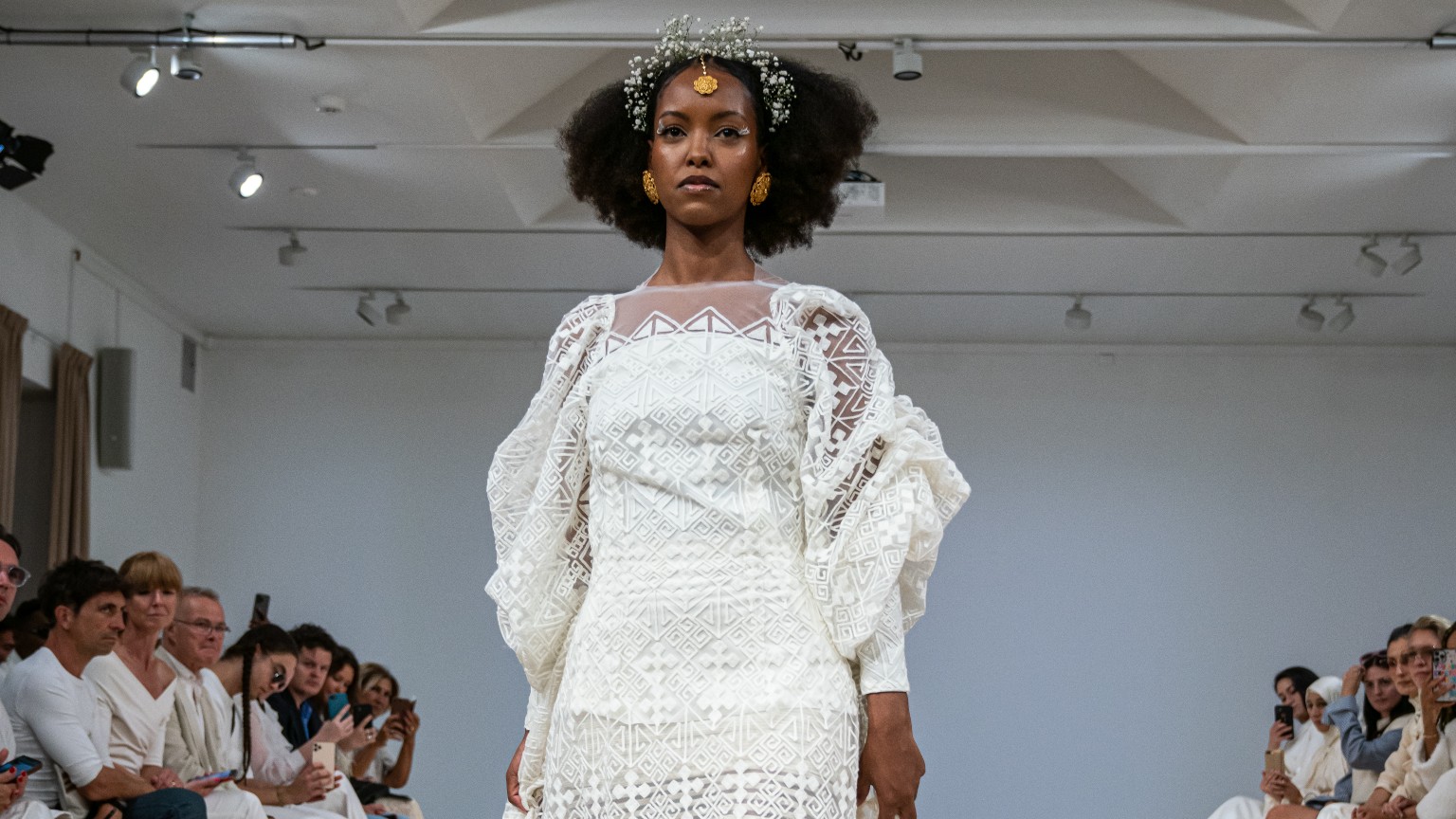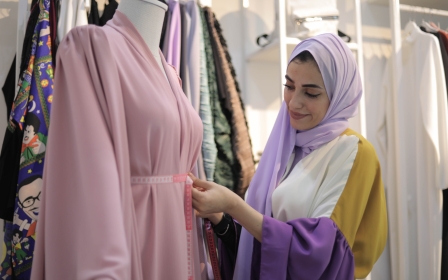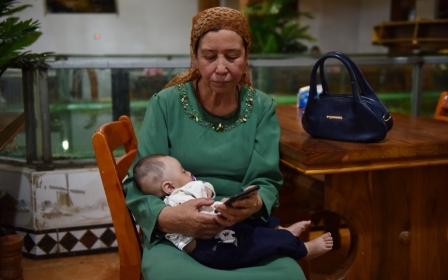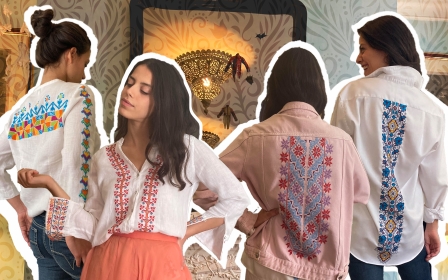Couture designer uses fashion to call for an end to the plight of Uyghurs
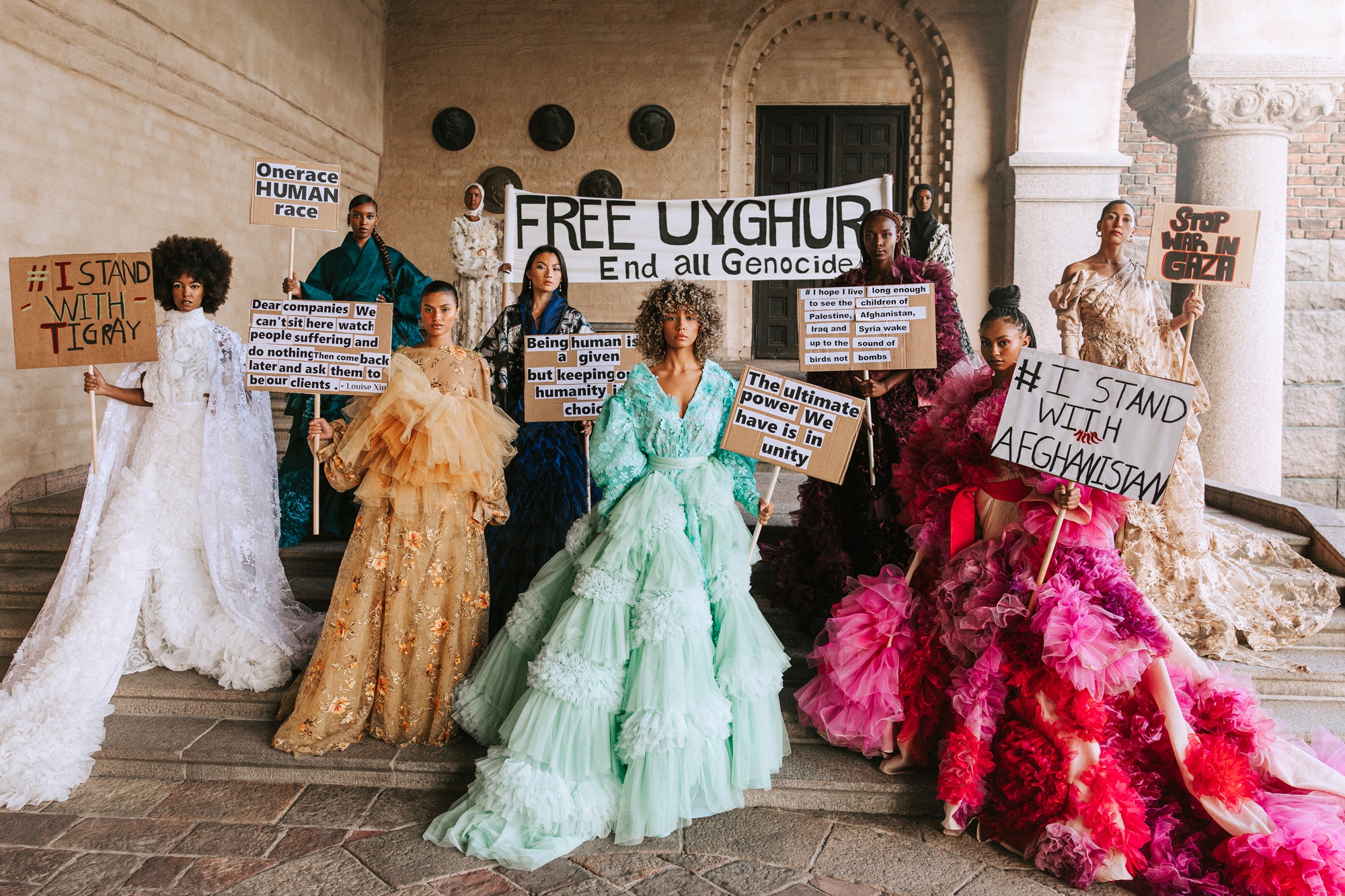
Louise Xin grew up adoring fashion and textiles, not knowing that years later, her love for design would catapult her to a global stage where she became outspoken about politics too.
From painting and drawing endlessly as a child, Xin soon transitioned into working with fabrics. Despite not holding a degree in fashion, she has managed to turn heads with her work.
The 28-year-old designer is based in Sweden and is the owner of Scandinavia's first couture rental-only brand, named after herself. She created the brand during the peak of the coronavirus pandemic when she found the time to focus on making her dream a reality.
While she was known for championing sustainable fashion and diversity in the looks she creates, Xin’s work gained international attention when she used her brand to call for an end to the forced labour and detention of China’s Uyghur community.
Championing human rights
New MEE newsletter: Jerusalem Dispatch
Sign up to get the latest insights and analysis on Israel-Palestine, alongside Turkey Unpacked and other MEE newsletters
While Xin was used to upcycling and using second-hand fabrics in her work, her designs took a new direction when she discovered the persecution of the Uyghur community.
“I was in Japan at the time, during the pandemic, when I came across a BBC News article showing videos of the camps in Xinjiang,” she told Middle East Eye.
“That was the first time I was hearing about it, it took me a year to properly research and educate myself because there was a lot of Chinese propaganda I was trying to filter through,” she explained.
Xin spent days researching what was happening to the Uyghurs, reading various reports, and watching documentaries.
What she discovered inspired her to do whatever she could to make a difference. And the most powerful tool she had at her disposal was fashion.
“When I researched further into it and discovered that one in five governments worldwide uses Uyghur forced labour, I made it my mission to use my platform as a fashion designer to do something about it.”
According to a United Nations report published earlier this year, the Chinese government has committed crimes against the Uyghurs that may amount to crimes against humanity.
The report cites examples and first-person accounts of mass arbitrary detention, torture, cultural persecution, forced labour, and other serious human rights violations.
Making a statement
During this year’s Stockholm Fashion week, the Chinese-Swedish designer kitted her models out in striking costumes, masked with oversized white t-shirts, emblazoned with bold messages including "end Uyghur forced labour", "end modern slavery", and "end child labour".
The performance gained attention globally and was broadcast across six European countries, including the UK, Denmark, and the Netherlands.
During last year's Stockholm fashion week show, Xin also supported the rights of Uyghurs, Palestinians, people from Afghanistan, and Tigray in Ethiopia.
The models in the show each held up signs with different statements on them, including "stop war in Gaza" and "I stand with Afghanistan".
The campaign was widely praised by people online, with the image posted to her Instagram account being liked over 37,000 times.
“I believe there were over 30 articles in nine different languages,” Xin says about the success of the campaign. She also received the Fabric of Life Award for it, which celebrates extraordinary achievements in textile design, innovation, and sustainability.
However, the campaign didn’t just resonate with people online. According to Xin, it reached many people from the Uyghur community as well.
'Another girl commented on my YouTube video saying that this was the first time she saw humanity in seven years'
- Louis Xin, fashion designer
“After the show, a Uyghur mother reached out to me on Instagram showing me her five-year-old daughter and explaining that her father was in prison in China. She thanked me for continuing to fight for her family. Another girl commented on my YouTube video saying that this was the first time she saw humanity in seven years,” says Xin.
The designer also had the opportunity to speak to a Uyghur labour camp survivor through her work, who she says is now based in the US and was moved by her fashion campaign.
More than just fashion
Although Xin’s striking runway performance had a global reach, she is well aware that her activism cannot end with girls in pretty dresses protesting at fashion shows.
She ensured that before the show, all of the models were well educated about different causes and the human rights violations taking place.
“All the girls made their own signs. If I wanted these girls to be a part of my show, I needed to raise awareness about their countries too,” she said.
The models were all from different backgrounds. Each wore their own traditional accessories in homage to the culture that they came from.
Xin was even able to use some traditional Uyghur fabric that was given to her and fused it with her own personal style by making it into a kimono and kaftan.
“It was a campaign where we had no budget but I think it received the recognition it did because it wasn't about me or the clothes, it was about the people and countries we raised awareness about”.
Beyond the runway, Xin is making sure that her efforts are making a difference.
This year, she became the first EU citizen and first individual within the fashion industry to be invited to the Sakharov Fellowship as a human rights defender to undertake a two-week training programme at the EU Parliament.
Attendees work to develop and enhance their ability to advocate for and create positive change and protect human rights.
“I've been getting a good view of the human rights work the EU are doing, getting the tools and also contacts with human rights defenders and survivors from around the world to connect with them and work on long-term outcomes”, she says.
This year, she has placed particular emphasis on advocating for the end of modern slavery and Uyghur forced labour. She has collaborated with forced labour survivors, including Nasreen Sheikh, to ensure that Uyghur voices are being spotlighted.
After Xin’s 2022 Fashion Week show, the EU Commission proposed to prohibit products made with forced labour from EU markets.
Mixing fashion and politics
Although her fashion campaign was successful, it was not without backlash.
As a Chinese descendant herself, Xin received many hate messages online.
"On Twitter I received typical hate comments saying: 'You don't know what you're talking about,' or 'how do you know this is really happening?', or 'go to hell.' None of which I took personally as I was expecting this to happen. I also had an article in the Global Times that was written against me by Chinese nationalists,” she says.
'I didn't know how to advocate about the Uyghurs because it's incredibly rare to see fashion mixing with politics'
- Louise Xin, fashion designer
One of the things that stuck Xin the most, she says, was the lack of mainstream media coverage of what was happening to the Uyghur community.
“I didn't know how to advocate about the Uyghurs because it's incredibly rare to see fashion mixing with politics,” Xin explained.
However, despite the challenges she faced, Xin says that many people from the Uyghur community told her that they had never felt seen before, especially by a fashion brand.
Sustainability and the future
Part of Xin’s activism is also to encourage sustainability within the industry.
Currently, her brand operates on a rental-only model where no dress is sold and no piece of fabric is wasted. Xin’s designs are one-off, custom, couture pieces, available to rent for various events, including red-carpet events.
“Previously we would have created our own garments or inherited our parents' clothing or borrowed something from someone else. So, the way we consume fashion now, especially fast fashion, is actually something pretty new. We haven't always been like this”, she explains.
Most of Xin’s dresses are made using upcycled and secondhand fabrics and she does her best to use as much upcycled fabric as possible with the aim of creating a 100 percent circular system in the future.
She also works on a 100 percent no-waste policy, so every part of the fabric is put to use and she also reuses the fabrics from older dresses to give them a new life on a new dress.
Now, she says, her aim is to build a foundation that helps victims of forced labour on the ground by providing financial resources, properly paid work, and education for children.
She is also getting more involved in raising awareness.
This year, she hosted a panel at Paris Fashion Week, discussing forced labour. She has also been invited to do an exhibition and fashion show at the Swedish Institute in Paris.
“Hopefully I will be able to create a bigger impact and help more people, the bigger the brand goes,” she says.
This article is available in French on Middle East Eye French edition.
Middle East Eye delivers independent and unrivalled coverage and analysis of the Middle East, North Africa and beyond. To learn more about republishing this content and the associated fees, please fill out this form. More about MEE can be found here.


